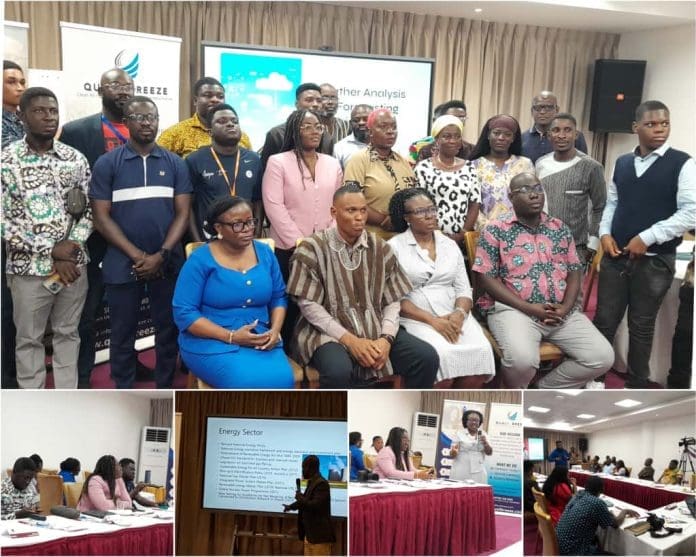Climate change and air quality took center stage in Accra on Thursday, Oct. 16, as journalists gathered for a capacity-building workshop aimed at improving reporting on the critical issues.
The workshop, organized by Climate Watch in collaboration with Quali-Breeze Ghana, focused on “Reporting for quality and climate change reporting.”
Air Quality: A Personal and Public Health Crisis
Paul Nwachukwu, the founder of Quali-Breeze Ghana, emphasized the critical nature of air pollution, which he called a severe threat that communities have become “comfortable with.”
Nwachukwu said the motivation for his organization’s work was deeply personal: having a son with asthma.
”Asthmatic parents that have kids that are asthmatic will understand what I mean, numerous trips to hospitals, emergencies and all that,” he said.
Quali-Breeze’s research, using Kasoa as a case study, revealed a high number of complaints about respiratory-related diseases, which they link to air pollution caused by practices like waste burning. The organization is working to educate the public on the serious implications of air pollution.
Quali-Breeze is also focusing on data collection through its “School and Monitor project.” They are currently installing six air monitors in schools in Kasoa and are seeking collaborations to expand the project.
Nwachukwu stressed the importance of community engagement and media partnership to “drive this message to our respective communities.”
He also highlighted the need for policy changes and the enforcement of existing laws, stating that data gathered from their monitoring projects will be used to advocate for action from the government and its agencies.
A Global Threat Requiring Local Action
Dr. Stanley Kweku Yadu, a public health physician and the Municipal Director of Health Services for Awutu Senya East (Kasoa), echoed Nwachukwu’s concerns, calling air pollution an “important public health threat, not only to Ghana, but to the world.”
Dr. Yadu called for the country to “set up and then we enact and enforce the necessary laws” to mitigate air pollution.
He specifically criticized the importation of waste, including electronic waste and used clothing, which are often poor quality. He pointed to areas like Agbogbloshie, where the burning of electronic waste exposes children, pregnant women, and market sellers to pollutants that affect “almost all organs of their body, from their brains to their lungs to their hearts and even the development of the children.”
Dr. Yadu urged policymakers to demonstrate seriousness in combating air pollution before entering international negotiations. He argued that engaging in environmentally harmful practices like illegal mining (galamsey) and cutting down forests weakens Ghana’s negotiating position for financial and other support schemes.
He recommended that Ghana first focus on its domestic policies, including:
* Enforcing regulations against excessive emissions from vehicles and factories.
* Enforcing limits on air quality measures.
* Enforcing issues on green spaces and better community planning.
By doing its “homework,” Dr. Yadu said, Ghana would be in a better position to negotiate, given that the country contributes less to environmental pollution than developed nations.
By Kingsley Asiedu
Source: newsghana.com.gh











